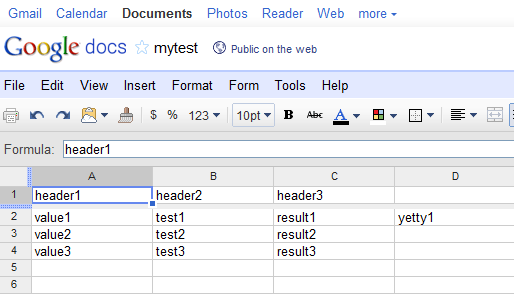Make use of Google Spreadsheets in your php scripts
Friday, April 8th, 2011 06:59 pm GMT +2
Ever wanted to integrate Google Spreadsheets with your application? This post describes a simple way of how you can do it using simple php script.
Step 1. Create sample google spreadsheet with random data
Here is how it might look like:

Step 2. Publish it on the web & obtain a secret key for your spreadsheet
Click on “Share” button at top right section, and make sure that your spreadsheet will be available to anyone, i.e. “Public on the web – Anyone on the Internet can find and edit”
See that URL? Copy-paste it & extract “key” from there, this will be required for programmatic access to your spreadsheet.
https://spreadsheets.google.com/ccc?key=0Am9NwGgzBIuBdDhSQ3FKMjRDZjAyYlZscUhmNUdKQnc&hl=en
Mine access key is 0Am9NwGgzBIuBdDhSQ3FKMjRDZjAyYlZscUhmNUdKQnc
Step 3. Retrieve JSONP data from Google API
By using special key from above you can download your data from following URL:
https://spreadsheets.google.com/feeds/cells/{$your_key}/1/public/basic?alt=json-in-script&callback=_
Google API does not support pure JSON, so in order to parse it using standard tools you need to strip extra JSONP overhead from the response.
Here a simple php code which downloads data & parses it using json_decode
/**
* Download & parse Google spreadsheet content
*
* @param unknown_type $link
*/
function download_sheet($sp_key) {
// construct Google spreadsheet URL:
$url = "https://spreadsheets.google.com/feeds/cells/{$sp_key}/1/public/basic?alt=json-in-script&callback=_";
// UA
$userAgent = "Mozilla/5.0 (Windows; U; Windows NT 6.1; en-US; rv:1.9.1.9) Gecko/20100315 Firefox/3.5.9";
$curl = curl_init();
// set URL
curl_setopt($curl, CURLOPT_URL, $url);
// setting curl options
curl_setopt($curl, CURLOPT_RETURNTRANSFER, 1);// return page to the variable
curl_setopt($curl, CURLOPT_FOLLOWLOCATION, 1);// allow redirects
curl_setopt($curl, CURLOPT_RETURNTRANSFER, 1); // return into a variable
curl_setopt($curl, CURLOPT_TIMEOUT, 30000); // times out after 4s
curl_setopt($curl, CURLOPT_SSL_VERIFYPEER, FALSE);
curl_setopt($curl, CURLOPT_SSL_VERIFYHOST, 2);
curl_setopt($curl, CURLOPT_USERAGENT, $userAgent);
// grab URL and pass it to the variable
$str = curl_exec($curl);
curl_close($curl);
// extract pure JSON from response
$str = substr($str, 2, strlen($str) - 4);
$data = json_decode($str, true);
// https://spreadsheets.google.com/feeds/cells/0Am9NwGgzBIuBdDhSQ3FKMjRDZjAyYlZscUhmNUdKQnc/1/public/basic/R1C2
$id_marker = "https://spreadsheets.google.com/feeds/cells/{$sp_key}/1/public/basic/";
$entries = $data["feed"]["entry"];
$res = array();
foreach($entries as $entry) {
$content = $entry["content"];
$ind = str_replace($id_marker."R", "", $entry["id"]['$t']);
$ii = explode("C", $ind);
$res[$ii[0]-1][$ii[1]-1] = $entry["content"]['$t'];
}
return $res;
}
$SP_KEY = "0Am9NwGgzBIuBdDhSQ3FKMjRDZjAyYlZscUhmNUdKQnc";
$data = download_sheet($SP_KEY);
print_r($data);
Here is how output should look like:
Array
(
[0] => Array
(
[0] => header1
[1] => header2
[2] => header3
)
[1] => Array
(
[0] => value1
[1] => test1
[2] => result1
[3] => yetty1
)
[2] => Array
(
[0] => value2
[1] => test2
[2] => result2
)
[3] => Array
(
[0] => value3
[1] => test3
[2] => result3
)
)
Of course, this is not an ideal solution:
- There is security through obscurity, by giving someone a key you can’t deny access to document in future
- Huge amount of data can’t be downloaded using this approach
One of possible applications could be publishing changelogs for your product:
- Product manager maintains changelog in Google spreadsheet
- An automation script pulls data from there & publishes it to your application build
